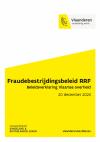
Recovery and Resilience Facility (RRF)
To alleviate the economic and social consequences of the COVID-19 crisis, the European Union has set up the recovery instrument NextGenerationEU. European support will allow Member States to better cope with the economic and social shock of the pandemic, with a specific focus on the green and digital transitions. The European Union aims to work towards an economy that is more independent and more resistant to external shocks, such as the COVID-19 crisis and climate change.
The COVID-19 pandemic has had a global impact, the effects of which were also felt in Flanders. In response, the Government of Flanders invested an additional €4.3 billion to restore the economic and societal fabric within Flanders. From this was born the ‘Flemish Resilience’ Recovery Plan, the most ambitious investment plan ever launched by a Government of Flanders. Europe also wanted to alleviate the economic and social consequences of the COVID-19 crisis, so the European Union set up a recovery fund within NextGenerationEU: the Recovery and Resilience Facility (RRF). NextGenerationEU(opens in new window) provides direct support and loans to Member States. To claim these grants and loans, Member States were required to submit a National Recovery and Resilience Plan (NRRP). The REPowerEU chapter(opens in new window) was also added to the Recovery and Resilience Plan. The aim of the REPowerEU chapter is to end European dependency on Russian fossil fuels and address the climate crisis.
A maximum of €5.9 billion in support had originally been allocated to Belgium. The European Commission adjusted this total amount downwards to €4.52 billion due, among other things, to the stronger-than-expected growth of the Belgian economy. Based on inter-federal agreements, it was determined that Flanders is entitled to 38.06% of the budget, or €1.72 billion. Moreover, an additional budget of €510.6 million was provided for Belgium for the REPowerEU chapter, of which €228.9 million was transferred from the Brexit Adjustment Reserve (BAR). Of the additional budget for Belgium, Flanders claims an additional budget of €208 million. To receive this total of €1.9 billion, Flanders has included 39 projects in the NRRP, including 25 investment projects (I) and 14 reform projects (R). Mostly projects from Flemish Resilience were used for this purpose. The funds will be disbursed as Flanders achieves the milestones and targets associated with these projects.
Publications
Anti-fraud Policy Statement Flanders and Policy Areas
To ensure the financial integrity of European funds in the implementation of the RRP, Flanders is pursuing a strict anti-fraud policy. This policy aims to prevent funds provided through the Recovery and Resilience Facility from being used inappropriately or incorrectly. Flanders is thus proactively contributing to protecting the European Union’s financial interests and reviving the economy in an equitable and responsible manner.
The Flemish coordinating entity monitors the implementation of projects funded by the European Union. The various implementing entities ensure that all parties involved comply with the applicable rules and regulations. In case of fraud or abuse, strict sanctions are imposed, and all necessary steps are taken to correct the situation. Flanders states in its Anti-Fraud Policy Statement that it will take all necessary measures to ensure the proper spending of financial resources, and is committed to transparency, control and accountability.